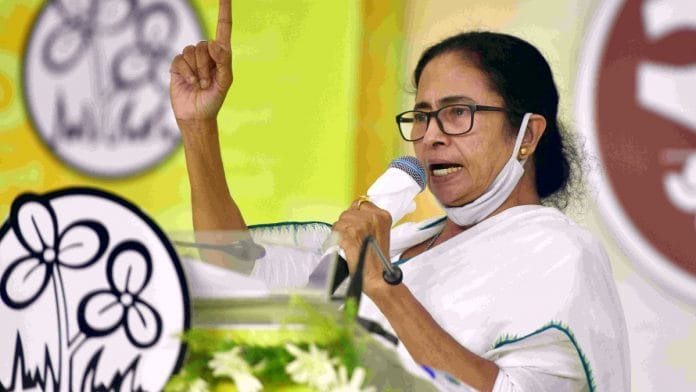Kolkata: The Mamata Banerjee government Monday, in line with Calcutta High Court orders on 22 July, submitted a voluminous affidavit to counter an earlier report by the National Human Rights Commission (NHRC)-led committee on post-poll violence in West Bengal, a senior police official confirmed to ThePrint.
“We have explained everything to the court. The incidents happened between 2 and 5 May,” the officer added. “After the new government assumed office, the number of incidents declined, barring a few sporadic ones that were not even political in nature.”
The NHRC panel had on 12 July submitted a 50-page report in the high court, claiming that between 2 May and 20 June, 1,934 complaints were lodged across police stations in the state, of which 1,168 FIRs of political violence were registered. The FIRs include 29 for murder and 12 for attempts to rape and sexual assaults.
The NHRC report, a copy of which was accessed by ThePrint, said it received all this data from the West Bengal DGP.
The affidavit comes on the day West Bengal Chief Minister Mamata Banerjee arrived in Delhi, where she is scheduled to meet Prime Minister Narendra Modi and opposition leaders, including Sonia Gandhi.
The Trinamool Congress government has maintained that all of the violence took place between 2 May, the day of results, and 5 May, when the chief minister was sworn in for her third term.
Trinamool state general secretary Kunal Ghosh Monday told ThePrint that the DGP’s report and the affidavit were examples of the government’s “fair-minded” administration.
“Didi (Mamata) said that there had been no post-poll violence, and she has a reason to say this. Our administration is fair, not like the one in Uttar Pradesh,” Ghosh said.
“The police and administration have accepted all complaints they received from various sources including the alleged victims, emailed complaints, and the ones forwarded by the NHRC. In some cases, police registered FIRs too,” he added.
“But during the probe, many complaints appear to be motivated or not a case of political violence at all. In some cases, it was found that the incident of violence happened between two localities or two groups of neighbours, and had nothing to do with politics.”
Also read: Why Jawhar Sircar as Trinamool’s RS choice shows Mamata’s serious intent to shed regional tag
Mamata vs NHRC
The government has been at loggerheads with the committee, which was constituted by the Calcutta High Court on 24 June.
The NHRC committee had submitted its first report to the high court on 30 June, following which, the court, in an interim order on 2 July, directed the state police to register all complaints and record statements of the “victims” in accordance with the law.
The government, however, has hit out at the panel, claiming that it was BJP-orchestrated, and singled out one of the members — vice-chairperson of National Commission for Minorities Atif Rasheed — as being part of the ABVP.
“The NHRC and NCM are constitutional bodies but the senior member’s social media profile mentions him as a nationalist and has hashtags of the ABVP. Will you still want me to believe that the committee is not controlled by the BJP?” West Bengal Law Minister Moloy Ghatak had earlier told ThePrint.
“All these committees and some of its members have political mandates, and the cases are politically motivated,” Ghatak had added.
Rasheed had responded, saying he was “hurt” by the West Bengal law minister questioning his integrity.
Other members of the committee include NHRC member and former IB chief Rajiv Jain; Rajulben L Desai, member, National Commission for Women; Santosh Mehra, director general (investigation), NHRC; Pradip Kumar Panja, registrar, West Bengal State Human Rights Commission; Raju Mukherjee, member secretary, West Bengal State Legal Services Authority and Manzil Saini, DIG (investigation), NHRC.
(Edited by Arun Prashanth)
Also read: Eye on 2024, Trinamool readies to take Mamata’s Martyrs’ Day rally beyond Bengal to BJP states






